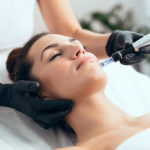Photo by LightField Studios at Shutterstock
Acne is perhaps one of the most common skin conditions in America, affecting at least 50 million people every year. Knowing how to treat and deal with your skin may not necessarily be easy. There are different types of ingredients that you should look for and different types of tips that you should follow.
We’ll look at 5 of the most common tips recommended by dermatologists below. By following these tips, you’ll be on your way to flawless, beautiful skin.
#1. Allow Any Acne Treatment 4 Weeks to Work
First and foremost, make sure that you give your acne treatment enough time to work. Most dermatologists recommend giving the treatment at least four weeks to work before calling it quits are switching to a new routine. Your skin needs enough time to get used to the new ingredients that are within the treatment. If you switch from one treatment to another too quickly or use too many products at a time, you could potentially irritate your skin, causing your acne to worsen.
After about four weeks, you should start to see some improvements. If you think that the treatment is not working quickly enough for you, don’t worry at all. This is merely the start. The full effects of the acne treatment will usually kick in right after according to most professionals.
#2. Be Gentle with Your Skin
Many people with acne feel tempted to scrub at their skin. They may wash their skin way too aggressively. When dealing with acne, the key is to be as gentle as possible. On the same note, avoid over exfoliating your skin. Make sure that you choose exfoliating products that aren’t too aggressive, as aggressive exfoliating products can irritate the skin and cause it to become inflamed.
In fact, exfoliating a pimple can cause healthy skin cells to be removed. It can also increase the risk of scarring! At which point, you’ll have a different type of skin problem on your hand that might require a lot more treatment to fix.
If you’re not sure which type of exfoliating products to use, speak to a dermatologist for a recommendation. A dermatologist in Southlake, TX can also recommend different types of products to try. Sometimes, it’s good to pair your skin care with your cleansing products. Your dermatologist can also take a look at the ingredients list to make sure that there aren’t any ingredients that might be too aggressive for your skin type.
#3. Avoid Touching Your Face
One of the most common tips that dermatologists give is to avoid touching your skin when you have acne. Your spans contain a lot of oils and dirt. If they aren’t clean, they can bring a lot of oils and dirt to your skin, which can cause further skin problems. It could also cause your acne problems to worsen significantly.
You also want to avoid squeezing out your pimples. When you try to squeeze your pimples, the dirt and oil on your fingers can cause the acne to spread. It can also cause further infections. Popping pimples can lead to scarring as well, and you definitely want to avoid that as the scars usually are much longer-lasting than the pimples themselves.
If you must touch your face, make sure that you wash your hands with warm water and soap first. Make sure that there aren’t any oils or dirt on your fingers.
#4. Take Time to Relax and Get More Sleep
Insufficient sleep can have a huge effect on your overall well-being. In particular, insufficient sleep can wreak havoc on your skin. The same can be said for stress. Stress can be equally as problematic for your skin as insufficient sleep.
Another common tip for most dermatologists is to get enough sleep and to reduce the amount of stress that you have in your life. This could be anything from taking on less work, getting a massage, practicing meditation, mindfulness and yoga and trying out art therapy or cognitive behavioral therapy (CBT). It really depends on what works for you. If you’re not sure what works for you, play around and try different things.
Try to go to sleep at the same time every night. Turn off the screens at least an hour before you go to bed and even drink some chamomile tea to relax. Your goal is to get at least 6 to 8 hours of sleep every night. If you’re able to reduce your stress levels and get more sleep, you might see an incredible change in your skin’s overall condition.
#5. Clean Your Hats and Headbands
A common culprit of forehead acne is dirty hats and headbands. If your wardrobe consists of many hats and headbands, you’re going to want to take a look at how clean they are. If you are someone who wears hats and headbands for hours and hours in your day, you may be trapping sweat, dirt and oils onto your forehead. These contaminants can clog your pores and cause you to get acne.
If you are experiencing a lot of forehead acne, consider taking off your hats and headbands more regularly. Give your skin a break and a chance to breathe. Also, make sure that you wash these accessories regularly with either dish soap, hand soap or a laundry machine.
Speak with a Dermatologist to Get a Personalized Skincare Routine
If you’re having any problems with your skin, one of the first things that you should do is to make an appointment with a dermatologist in Southlake, TX. A professional can access your skin type to determine the underlying causes behind your problems. They can help you find a solution that works for you.
If you’re interested in seeing a professional, consider giving Compassion Dermatology a call at 817-380-5911. We offer a wide range of services, from complete skin evaluations to medical and surgical procedures. We can help you deal with all types of skin problems.


